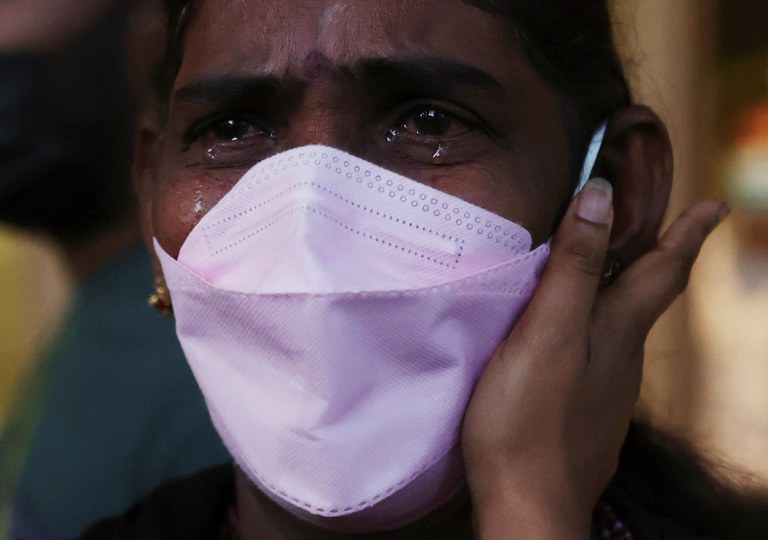Singapore executes Malaysian drugs convict despite family's appeals over his mental disability
2022.04.27
Kuala Lumpur
 Mourners pay tribute to Malaysian national Nagaenthran K. Dharmalingam, who his family says was mentally disabled and who was executed for trafficking heroin into Singapore, during a memorial service in Singapore, April 27, 2022.
Mourners pay tribute to Malaysian national Nagaenthran K. Dharmalingam, who his family says was mentally disabled and who was executed for trafficking heroin into Singapore, during a memorial service in Singapore, April 27, 2022.
Singapore put to death a mentally disabled Malaysian man on Wednesday on a drug conviction, his former lawyer said, after unsuccessful court appeals and international requests for clemency from the city-state, which has some of the world’s toughest anti-narcotics laws.
Attorney M. Ravi was among many anti-death penalty activists who turned to social media to mourn Nagaenthran Dharmalingam’s execution at the gallows.
“Nagaenthran Dharmalingam. April 27, 2022. Executed by hanging, this date, by the state,” he posted on Twitter on a black-colored notice with white type.
Reprieve, a human rights group that intervenes against the death penalty, said Nagaenthran’s name would “go down in history as the victim of a tragic miscarriage of justice.”
“Hanging an intellectually disabled man because he was coerced into carrying less than three tablespoons of diamorphine is clearly unjustifiable,” the group said on Twitter.
On Tuesday, the Singapore Court of Appeal dismissed a last-minute legal challenge by Nagaenthran’s mother, Panchalai Supermaniam. Her challenge was based on the fact that the judge who presided over and dismissed Nagaenthran’s appeals was the attorney-general who had prosecuted him and secured his conviction.
Nagaenthran’s remains are to be taken to his family home in Ipoh, in the state of Perak, Malaysia, for a funeral on Friday, his brother, Navin Kumar told news media in Singapore.
In a statement issued Wednesday evening, Malaysia’s foreign ministry said Prime Minister Ismail Sabri Yaakob and Foreign Minister Saifuddin Abdullah had again sent letters this week to their counterparts in Singapore seeking a reduction in Nagaenthran’s sentence.
In response to a similar letter in November, the Singapore government said Nagaenthran had been accorded full due process under the law.
In addition to sending the letter, Malaysia’s foreign ministry extended its condolences to Nagaenthran’s family.
“We will, through the Malaysian High Commission in Singapore, continue to extend the appropriate consular assistance to his family members,” it said in a statement.

Panchalai Supermaniam, mother of Nagaenthran Dharmalingam, weeps outside the Supreme Court in Singapore after her last-ditch challenge to his execution was dismissed, April 26, 2022. [Reuters]
Nagaenthran’s case, meanwhile, reignited a debate on abolishing capital punishment in Malaysia, where there has been a stay on executions since 2018.
Despite the stay, according to statistics from 2019 – the latest that are publicly available – 1,281 people are languishing in 26 detention facilities across Malaysia waiting to be hanged.
Amnesty International, which conducted a study in 2019 on why Malaysia must abolish executions, reported that most people on death row had been sentenced for drug-related offenses.
In 2017, Malaysia amended the Dangerous Drug Act 1952. Under the amendment, if a case met certain conditions, such as no evidence of buying and selling drugs, the court was required to sentence a convict to life in prison, “and whipping of not less than 15 strokes if such conditions are satisfied,” lawyer and former prosecutor Samantha Chong told BenarNews in November.
Despite that amendment and the ongoing moratorium on executions, Malaysian courts continue to sentence people to death as there is no other recourse under the law.
Nagaenthran’s case also shined a spotlight on Singapore’s use of the death penalty and its drug laws, which are among the harshest in the world.
Its Misuse of Drugs Act mandates the death penalty for any individual found smuggling drugs in excess of 15 grams (0.5 ounces) into the country. Nagaenthran was arrested for smuggling in 42.72 grams (1.5 ounces) of heroin.
Nagaenthran was arrested by Singaporean authorities on April 22, 2009 when he was 21 for trafficking 44 grams of heroin into the city-state. He was sentenced to death on Nov. 22, 2010.
His lawyer appealed the sentence, saying his client had an IQ of 69 – a level said to indicate an intellectual disability. A request for a presidential pardon was rejected on June 1, 2020.
The execution was delayed for months when Singapore’s highest court in November stayed the order after Nagaenthran tested positive for COVID-19.
Between 2014 and 2019, Singapore executed 35 people, most of them for drug offenses, according to official data.
In a statement earlier this week urging Singapore to delay Nagaenthran’s hanging, the United Nations Office of the High Commissioner on Human Rights said the city-state resumed executions on March 30 after a pause of more than two years.







